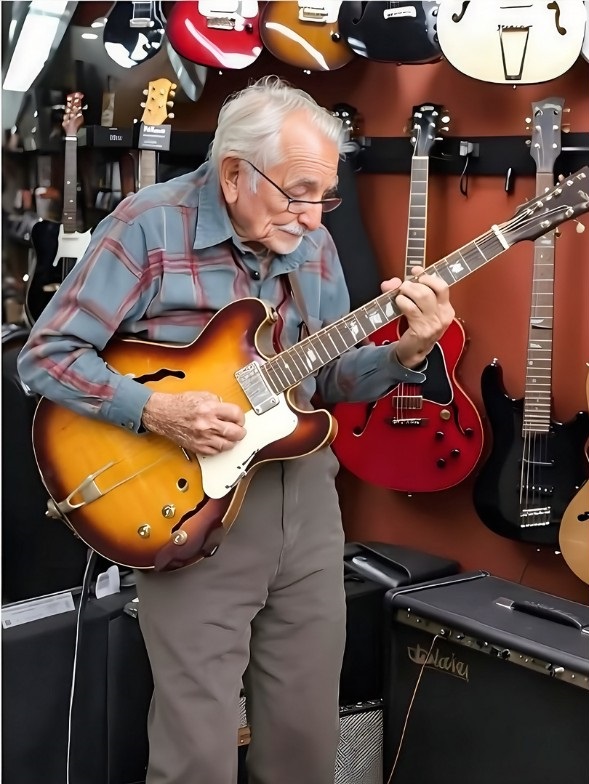When Otha Anders pushed a dolly stacked with heavy plastic water jugs into his local bank, the metallic rattle inside drew every eye in the room. The sound was sharp, rhythmic, and impossible to ignore. Bank employees paused their work, customers glanced over with curiosity, and for a moment the ordinary rhythm of the day was interrupted by the sheer oddity of what they were witnessing. Anders, a supervisor for the Jackson School Board, had just walked in carrying more than four decades of persistence, faith, and obsession—45 years’ worth of pennies.
Anders wasn’t just another man rolling in spare change. His collection told a story of patience and quiet devotion, shaped by his unique view of the world. Where most people treat pennies as little more than pocket clutter, Anders believed they carried a deeper meaning. For him, every penny found on the ground wasn’t just luck—it was a reminder from God to be thankful. The habit began casually, with him picking up loose change here and there, but over time it grew into something much larger. What started as a simple hobby evolved into a daily ritual that became both a spiritual practice and an obsession.
He explained that there were days when he forgot to pray or felt too distracted to take a moment of gratitude. On those days, more often than not, he would stumble upon a penny. Instead of brushing it off as coincidence, Anders saw it as a message from above. He believed God placed those pennies in his path as a wake-up call, urging him to pause and realign with faith. While other people made wishes on pennies, Anders said prayers over them. Each coin was a spiritual checkpoint, a nudge to remain thankful no matter the circumstances of his life.
Over 45 years, Anders faithfully saved every penny he could. He didn’t spend them, didn’t cash them in, and didn’t let them slip back into circulation. Instead, he stored them in five-gallon plastic water jugs, one after another, until his home became filled with these enormous, heavy containers. Friends and family sometimes raised their eyebrows at the dedication, and while his wife and children supported him, they also recognized it as a quirky, almost puzzling obsession. Still, Anders insisted there was meaning behind it. To him, each jug was a monument to patience, gratitude, and divine reminders.
By the time he decided to take them to the bank, Anders estimated that he had collected hundreds of thousands of pennies. The bank employees, who had never seen anything quite like it, braced themselves for an unusual day. The process of freeing the coins from the water jugs wasn’t easy. The containers had to be split open with axes and hammers, and the staff worked tirelessly for hours. Pennies spilled across counters and clattered into trays as machines whirred to life, counting every coin with mechanical precision.
The entire operation took more than five hours. Employees laughed, shook their heads in disbelief, and marveled at Anders’ commitment as the counting machines clicked away. By the end of the process, the final number was revealed: $5,136.14. After 45 years, Anders’ unusual practice had produced a tangible result—a small fortune, born one penny at a time. Broken down annually, it equated to about $114.40 per year, a modest figure that illustrated just how long and patient his journey had been.
Most people might have looked at the total and been disappointed, considering the effort it took to amass so many coins. After all, saving for nearly half a century had produced just over five thousand dollars, hardly enough to retire on or buy anything extravagant. But Anders was never motivated by wealth. To him, the money was secondary. The true reward was in the discipline, the reminders of gratitude, and the quiet joy of sticking with something for so long.
Still, practical needs demanded attention. Around the time he cashed in his pennies, Anders had received a sizable dental bill. Rather than lament spending his hard-earned collection on medical expenses, he was grateful that the money was there when he needed it most. The rest, he used for something meaningful—treating his family to a trip and donating to his church, acts that aligned perfectly with the values that had inspired his penny-saving in the first place.
Anders’ story quickly spread, striking a chord with people across the country. It wasn’t just about the novelty of someone hoarding pennies for decades, but about what those pennies represented. In a world obsessed with instant gratification and quick rewards, Anders embodied patience, faith, and perspective. He found meaning in something most people overlook, transforming small moments into lifelong reminders of gratitude. His coins weren’t just currency; they were lessons stacked inside plastic jugs, waiting for the day they would be poured out and counted.
The reactions from the public were varied. Some admired his persistence, others laughed at the eccentricity, and a few even tried to calculate what would have happened if he had invested the pennies instead of saving them. But to Anders, none of those perspectives mattered. His pennies weren’t about financial growth or economic wisdom. They were about faith, consistency, and the personal satisfaction of knowing he had turned something ordinary into something extraordinary.
Even after cashing in, Anders didn’t abandon his habit. He admitted that he still picked up pennies whenever he found them, still treating each one as a reminder to pause and give thanks. The bank visit had ended a 45-year chapter, but the story of gratitude and faith it told would continue for as long as he lived.
Otha Anders may not have become rich in the conventional sense, but his story left behind a wealth of inspiration. In those $5,136 worth of pennies lay decades of discipline, countless whispered prayers, and a lesson about finding meaning in the smallest things. His life’s message was clear: gratitude doesn’t need to be grand, faith doesn’t need to be complicated, and sometimes the most ordinary objects—like a penny lying on the sidewalk—can hold the greatest reminders of what truly matters.



